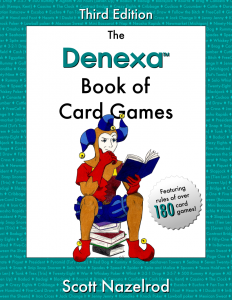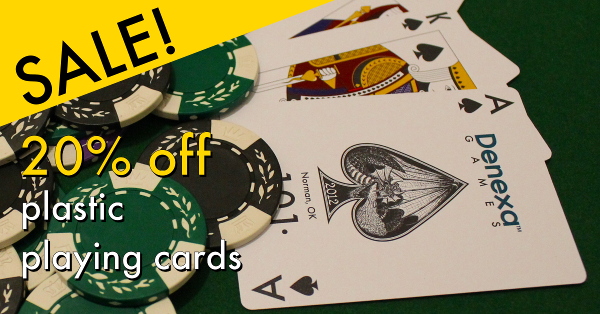Speculation
Speculation is a light and simple betting game. While the main goal of the game is straightforward—you just have to end the hand holding the highest-ranking card of a certain suit—more money can change hands by players selling potentially valuable cards to each other! A player may not win the game, but can still come out ahead by making a deal with another player to sell off a high-ranking card.
Speculation was most popular in the late 1700s through about 1880. During this time period, it was mentioned in works by several prominent authors, including Jane Austen and Charles Dickens. The producers of a film of Austen’s Mansfield Park called in card game author and historian David Parlett as an advisor for a scene involving a game of Speculation. Parlett’s research on the game resulted in him publishing this reconstructed set of rules, allowing card players everywhere to rediscover the classic game.
Object of Speculation
The object of Speculation is to hold the highest card of the trump suit at the end of the hand.
Setup
To play Speculation, you’ll need a standard 52-card deck of playing cards. Keep all of your risk limited to that in the game—don’t risk your cards failing you in the middle of the game! Always make sure to play with Denexa 100% Plastic Playing Cards.
Players should decide if real money will be wagered, and if so, the value of each chip. If chips have real-world value, each player buys in for their desired number of chips. Otherwise, give each player an equal number of chips. All players ante, forming the pot.
Shuffle and deal three cards, face down, to each player. Players may not look at their cards. Instead, they should keep the three cards in a squared-up stack. Then, deal yourself one card, face up, in front of you. The suit of this card, the upcard, becomes the trump suit. The stub takes no further part in game play.
Game play
Cards rank in their usual order, with aces high.
The upcard
The upcard belongs to the dealer. If it is an ace, there is no way it can be beaten, so the dealer automatically wins the hand and takes the pot. Otherwise, they may choose to keep this card, or sell it to any other player. The form such a sale takes is up to the dealer to decide; they may offer a firm price, or negotiate a price with a buyer, or even auction it off. Payment is made directly to the dealer, not the pot.
Play of the hand
The player to the left of whoever ends up with the upcard (the player to the dealer’s left, if they did not sell the upcard; otherwise, the player to the left of whoever bought it) takes the first turn. They turn up the first card of their stack of cards. The turn then passes to the left, and that player turns up a card, and so on. When the turn reaches whichever player is showing the highest trump, that player is skipped over and does not have to reveal any cards.
When a new highest trump is revealed by any player, they may choose to keep it or to sell it, in the same way the upcard could be sold. Again, this money goes to the player turning up the trump, not the pot. Once the owner of this card is decided, play picks up with the person to that player’s left.
Between turns, a player may also offer to buy one of another player’s face-down cards, sight unseen. This is normally done by the current holder of the high trump, to reduce the number of opportunities for higher cards to be revealed. Again, the other player may refuse the deal, or haggle with the buyer over the price.
Ending the hand
As players run out cards to reveal, eventually the ultimate holder of the highest trump will be known. This player takes the pot. They then serve as dealer for the next hand.


